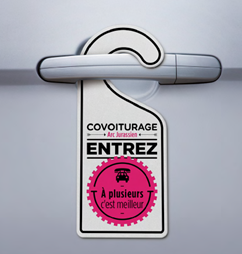“Together it’s better” carpooling initiative in the Jura Arc
The Jura Arc carpooling project promotes car-sharing in this mid-mountain region, which is underserved by public transport. The initiative aims to make it easier for local workers to get around, while promoting social links and reducing greenhouse gas emissions.
How does carpooling work in the Jura Arc?
A centralised mechanism to promote collective journeys to work
The car-sharing initiative is being developed along the 230 km of the French-Swiss border in the Jura Arc. In order to connect car-poolers, a telephone centre has been set up, accessible on working days from both France and Switzerland. People wishing to find a driver or share a car can call this centre, which will suggest solutions and put car-poolers in touch with each other.
Official car-sharing car parks have also been set up to make it easier for car-sharers to find each other. Thanks to the support of the local authorities, there are already more than 100 car-sharing spaces in the Jura Arc.
Local companies can also join the project to encourage their employees to share car journeys. To better inform employees, the project has developed a communication kit that companies can use. It not only promotes the project, but also provides useful guidelines for car-poolers and legal information, for example on car insurance. Companies can also organise information days for their employees to promote carpooling and answer their questions.
Every year in November, when traffic conditions become more difficult as winter approaches, these companies also take part in the challenge organised by the Carpooling Project. This competition aims to encourage people to try carpooling or to make it more popular. It rewards several carpooling teams as well as the best company in terms of carpooling promotion.
Inclusive governance
The project is supported by 16 local administrations in the majority of cantons, agglomerations and municipalities, each of which acts as a local contact point for potential car-poolers. More than 130 companies also participate in the project and are actively involved in its development.
Each year, company mobility officers are invited to participate in mobility task forces to discuss potential problems, possible solutions and further developments to promote carpooling in the region.

Results and benefits of the Jura Arc carpooling project
With 130 companies involved, the project targets more than 35,000 potential car-poolers. Of these, 25% use car-pooling regularly, i.e. more than 8,700 people. According to the project managers, carpooling has doubled in the region in 5 years.
By involving businesses in the project, the initiative is helping to boost the region’s economic attractiveness. Such a project, in an area with poor public transport, optimises the conditions for the establishment of new companies and stimulates job creation in the Jura Arc. It is also an opportunity for existing companies and employees to get involved in sustainable mobility. The environmental benefits of such a practice are indeed interesting, since 1.1 tonnes of CO2 can be saved each year for a normal car. This also has an impact on the landscape, as less space needs to be taken up by car parks.
Carpoolers can also enjoy the economic benefits of carpooling, saving around €2,300 a year on oil and car maintenance. It is also a good way for users to enjoy a safe and congestion-free journey and to make more social contacts with other carpoolers.
The benefits of carpooling are obvious in a region where workers often cross the border and traffic congestion is high. Euromontana identified carpooling and car-sharing as possible solutions for greener rural mobility in 2014 as part of the Move On Green project. While using a digital tool to connect people seemed to be one of the difficulties, the Jura Arc carpooling project seems to have overcome this problem with the development of its telephone centre.
